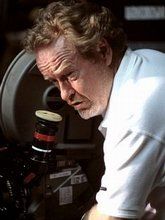| Scott, Ridley
 |
Date of birth
30 November 1937, South Shields, Tyne and Wear, United Kingdom
Mini biography
Sir Ridley Scott (30 November 1937, South Shields, Tyne & Wear, England, UK)
Sir Ridley Scott (born 30 November 1937) is an English film director and producer known for his stylish visuals and an obsession for detail.
One of the most promising directors of the late ‘70s, Ridley Scott displayed stylistic flair and remarkable storytelling abilities in such films as The Duellists (1977) and his landmark Alien (1979).
Born in 1937, in Northumberland, England, Scott was educated at the West Hartlepool College of Art and London’s Royal College of Art.
After completing his education, he became a set designer for the British Broadcasting Company in the early ’60s, eventually getting promoted to director of such popular BBC series as the long-running police adventure Z Cars.
With the establishment of his own firm, Ridley Scott Associates, Scott was in on the ground floor of some of the most inventive European TV commercials of the 1970s.
“People say I pay too much attention to the look of a movie but for God's sake, I'm not producing a Radio 4 Play for Today, I'm making a movie that people are going to look at. ”
Scott is to receive a star on the Hollywood Walk of Fame in 2011. He is the older brother of film director Tony Scott.
The director’s transition to the big screen came with his direction of 1977’s The Duellists, a visually striking Napoleonic war film that won the Jury Prize for Best First Feature at the Cannes Film Festival. Further success followed with 1979’s Alien, which established Scott as both an important director and a shining knight for horror and sci-fi devotees. In 1982, the director found himself at the center of a storm around his production of Blade Runner.
After repeated clashes with studio executives over the film’s complex content and downbeat finale, Scott added a voice-over narration and a more positive ending. The results sparked an outcry from film purists, and Blade Runner fell victim to negative reviews and poor box-office results. It wasn’t until the early ‘90s that the director’s cut was finally released, theatrically and on video cassette, and the film was recognized as a science fiction masterpiece.
In the meantime, Scott continued to direct such films as the 1986 fantasy Legend, starring Tom Cruise, and 1989’s Black Rain, which featured Michael Douglas. In 1991, he encountered critical and commercial triumph with Thelma & Louise. Starring Geena Davis and Susan Sarandon, the film was nominated for six Academy Awards, including Best Director for Scott.
Though, his next project, 1992’s 1492: Conquest of Paradise, proved to be a complete flop, and for the next few years Scott relinquished his directorial duties in favor of producing such films as Monkey Trouble and The Browning Version (both 1994). Scott returned to the director’s chair in 1996, with White Squall, an action-adventure film set on a boat full of troubled teenage boys. Unfortunately, the film performed poorly among critics and at the box office, and Scott’s next feature, G.I. Jane (1997), suffered a similar fate. He then returned to producing, working on the 1997 TV series The Hunger.
After producing the 1998 black comedy Clay Pigeons, Scott returned to directing with Gladiator (2000), a Roman epic starring Russell Crowe as its titular hero. The film was hailed by some critics who saw it as a return to grand-scale moviemaking, while others saw it as merely overblown. Regardless of the critics’ opinions, Gladiator was undoubtedly wildly popular, earning five Oscars, including Best Picture, at the 73rd Annual Academy Awards.
In 2001, Scott applied his icy-cool visual style to Hannibal, the much-anticipated sequel to 1991’s Silence of the Lambs. Although the film broke the box-office record for the largest opening weekend for an R-rated film, critics were less than pleased with Hannibal’s combination of smug, stuffy disaffection and vomit-bag-worthy gore. Scott’s skills as a director of action were better put to the test later that year with Black Hawk Down.
While some critics objected to Black Hawk’s simplified portrayal of the U.S. military involvement in the region, public lined up in droves for the flag-waving Jerry Bruckheimer production, which would also garner Scott his third Best Director Oscar nomination. Recoiling from the high-profile prestige projects for a spell, Scott turned his focus to the big-screen adaptation of Matchstick Men, a dysfunctional-con-man tale. Though hardly a blockbuster, the heist comedy garnered mixed but generally positive reviews.
In 2005, the director helmed the would-be epic Crusades historical film Kingdom of Heaven with a Gladiator-esque budget and all-star cast. Unfortunately, the film was a dud both with critics and audiences, so Scott returned to a more intimate kind of storytelling with the 2006 drama A Good Year. The film starred Russell Crowe as a hotshot broker who finds himself in the depths of a life-crisis when he inherits his beloved uncle’s estate and discovers that the simple lifestyle it offers may give him more satisfaction than his fast-paced, high-power job.
His films include:
1977 The Duellists
1979 Alien
1982 Blade Runner
1985 Legend
1991 Thelma & Louise
2000 Gladiator
2001 Black Hawk Down
2001 Hannibal
2003 Matchstick Men
2005 Kingdom of Heaven
2007 American Gangster
2008 Body of Lies
2010 Robin Hood
Director - Selected filmography
-
All the Money in the World (2017)
-
The Martian (2015)
-
Body of Lies (2008)
-
American Gangster (2007)
-
A Good Year (2006)
-
Kingdom of Heaven (2005)
-
Matchstick Men (2003)
-
Black Hawk Down (2001)
-
Gladiator (2000)
-
Thelma & Louise (1991)
-
Blade Runner (1982)
-
Alien (1979)
-
The Duellists (1977)
|

